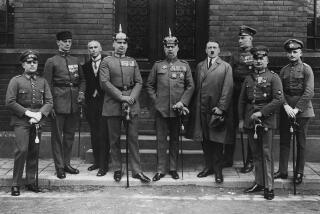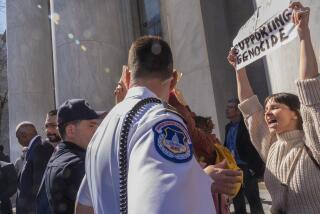Adolf Eichmann and the hunt for monsters
On May 23, 1960, then- Israeli Prime Minister David Ben-Gurion stood at the podium in the Knesset and solemnly said: “A short time ago one of the most notorious Nazi war criminals, Adolf Eichmann, was discovered by the Israeli security services. Adolf Eichmann is already under arrest in Israel and will shortly be placed on trial.”
The announcement shocked Israelis and the world alike. It should have. No country was known to be actively pursuing war criminals. Such an operation -- locating and seizing Eichmann in Argentina -- seemed beyond the ability of an inexperienced, ragtag spy agency such as the Mossad. And such a trial, on the part of a hardly disinterested young nation, would be audacity itself.
The truth is, without luck, individual bravery and the willingness of Israel to jeopardize its international standing, the operational manager of the “Final Solution of the Jewish Question” would never have been brought to justice.
More than any other event, the groundbreaking gamble of Eichmann’s capture, trial and execution made real the injunction to “never forget.” It also set the stage -- as a model and a cautionary tale -- for what remains a controversial proposition: How shall we deal with history’s monsters?
In May 1945, with the Third Reich on the verge of surrender, SS Lt. Col. Adolf Eichmann headed into the mountains of Austria. In the postwar chaos, under an assumed identity, he would escape a pair of Allied POW camps, lie low in the forests of northern Germany and then follow the Nazi “ratlines” to Argentina where, with his wife and three sons, he started a new life hidden in plain sight.
For most of this time, only Simon Wiesenthal and fellow concentration camp survivor Tuviah Friedman were dedicated to searching for him. The West Germans, the only government with the clear mandate to arrest and try Eichmann, had shown little interest in stirring up the crimes of the past. The Americans, focused on the rise of the Cold War, were also not interested. “We are not in the business of apprehending war criminals,” noted an internal CIA memorandum in 1953. Even the Israelis, burdened with the day-to-day survival of their new nation, had invested few resources into hunting down those responsible for the Holocaust.
In the end, it wasn’t Wiesenthal and Friedman who found him. Pure happenstance started a cascade of events that led to Eichmann’s arrest.
In a Buenos Aires suburb, Sylvia Hermann brought home a young man she’d met named Nick Eichmann. He bragged of his father’s exploits in the Wehrmacht and casually condemned the Jews. Lothar Hermann, her half-Jewish German emigre father, wondered: Could he be the son of that Eichmann?
Lothar alerted Fritz Bauer, one of the few West German prosecutors seeking former Nazis, about his suspicions, and then he and his daughter launched an amateur investigation. Bauer -- worried that his own government would not pursue the leads or, worse, that someone within it would alert Eichmann that he’d been discovered -- passed the tip to the Israelis.
The Mossad first bungled the investigation, but Bauer persisted, presenting it with yet another secret source placing Eichmann in Argentina. The operation would require the Mossad, small and inexperienced at the time, to operate halfway around the world in a country known for its support for Nazi Germany. Its agents would have to succeed in three operations: capturing Eichmann, detaining him for an indeterminate period, then secreting him out of the country. All the while, they would be violating Argentine sovereignty, risking prison.
Ben-Gurion approved the mission that is now part of spy legend. What is less known is the outpouring of protest that followed Israeli officials’ announcement of the capture and their intention to try Eichmann themselves. The Argentines protested to the United Nations, and the Security Council condemned Israel for its activities. There was an international uproar about the right of Israel to create a special tribunal to prosecute Eichmann, a German national whose crimes were committed before Israel was even a state.
Once again, Ben-Gurion forged ahead, seeing the capture and trial of the Nazi war criminal as a way to remind a younger generation of Israelis, and the world, that they must remain vigilant lest history repeat itself.
The gamble paid off. The testimony of survivors, and Eichmann’s inadequate defense that he was merely following orders, sealed his fate. The Nazis’ crimes against the Jewish people were exposed in horrifying, exhaustive detail in newspapers and on radio and television. For the world, justice was served, and Ben-Gurion’s searing reminder still resonates today.
And yet, half a century later, the controversies provoked by Eichmann’s capture and trial are a long way from solution. Who will be investigated for war crimes and crimes against humanity? By what law and in what jurisdiction? And who will bring them to account?
Events mostly prove the imperfection of the systems we’ve devised. “Dr. Death,” the Nazi physician Aribert Heim, died a free man in Egypt, age 78. In Cambodia, it has taken 30 years for aging Khmer Rouge cadres to face judgment for their actions in the infamous killing fields. Sudan’s president, Omar Hassan Ahmed Bashir, indicted last month by the fledgling International Criminal Court for crimes against humanity in Darfur, is famously defiant. He is unlikely ever to stand trial.
But even this imperfect justice is more than the world had available in the 15 years after the end of World War II.
Slow and flawed as they are, these tribunals increase the odds against the monsters. They need our support. Because without them, those seeking justice for future Eichmanns will face the same almost impossible odds that those pursuing the architect of the Holocaust barely managed to surmount.
Neal Bascomb is the author of the just published “Hunting Eichmann: How a Band of Survivors and a Young Spy Agency Chased Down the World’s Most Notorious Nazi.”
More to Read
A cure for the common opinion
Get thought-provoking perspectives with our weekly newsletter.
You may occasionally receive promotional content from the Los Angeles Times.






